Japan’s new international resource strategy to enhance the foundation of a stable supply of oil
(in provisional translation)
(English ver.) 2020-11-20
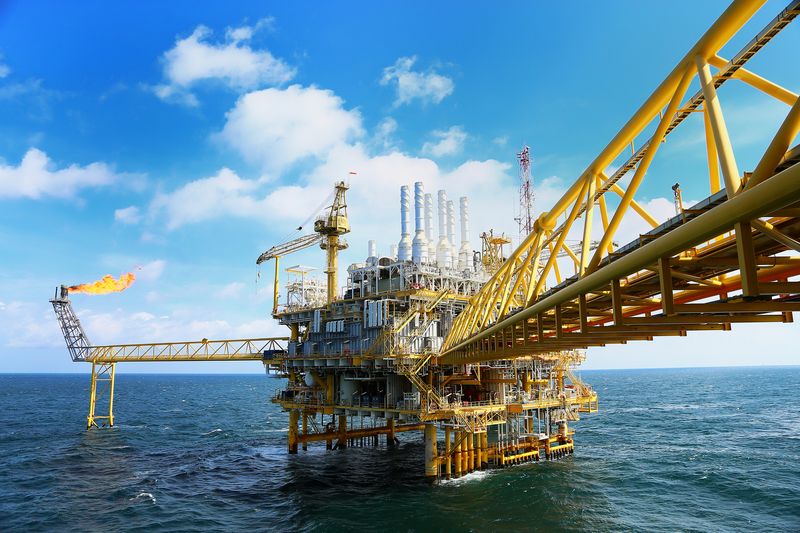
In recent years, the international energy situation has been changing rapidly. Japan, which depends on imports from overseas for most of its demand for resources including fuels, is vulnerable to impacts of the changing international energy situation. Against this background, Japan’s new “international resource strategy” was established in March, 2020. Japan’s basic energy policy, referred to as “3E + S”, is to simultaneously achieve Energy security, Economic efficiency and Environmental suitability with the underlying premise that Safety is always the primary concern. This series of articles will present the measures that Japan is taking based on this new strategy while keeping its 3E+S policy.
Toward securing a stable supply of oil which accounts for 40% of Japan’s demand for energy
Oil is a crucial source of energy for Japan. It accounts for approximately 40% of primary energy supply in Japan. The improvement of fuel consumption efficiency for automobiles and the introduction of electrified vehicles (xEVs) have reduced the domestic demand for oil year by year. Nevertheless, oil remains an important source of energy.
Most of Japan’s requirements for oil are supplied by imports as shown in the following graph. Among countries from which Japan imports oil, Saudi Arabia is ranked 1st with a share of 35.8%, followed by the UAE 29.7%. The Middle East has a dominant share of 88% with Qatar, Kuwait and other countries included. This situation is expected to continue for the foreseeable future.
Japan’s Crude Oil Imports
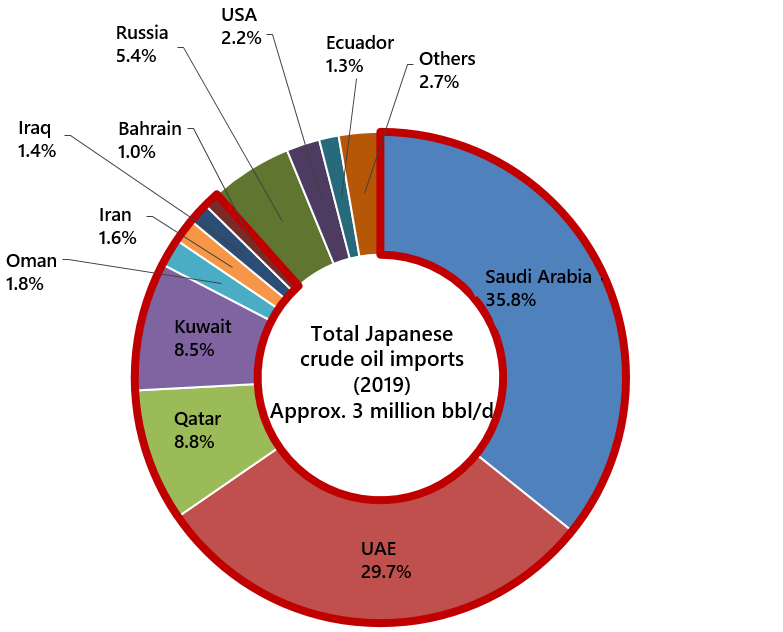
(Source) Trade Statistics published by the Ministry of Finance
However, the recent state of affairs in the Middle East have been tense. It may still remain in your memory that oil facilities in Saudi Arabia were attacked in 2019. In order to secure a stable supply of oil under such circumstances, it is necessary to avoid heavy dependence on particular countries and thereby reduce risks. It is essential to build close relationships with not only Saudi Arabia and the UAE but also other countries in the Middle East by exerting active diplomatic efforts in terms of resources, which will lead to the diversification of supply sources.
The new strategy upholds enhanced diplomatic efforts toward building close relationships. The Japan Oil, Gas and Metals National Corporation (JOGMEC) and other energy-related organizations have been making efforts separately to build relationships with countries in the Middle East.
In the future, it is important to make public-private concerted efforts in addition to the collaboration between those organizations. Against this backdrop, it has been decided to inaugurate, with the government acting as an intermediary, the “Consultative Committee for Cooperation with Oil Producing Countries in the Middle East”. From now on, it is expected that efforts will be made on the all-Japan basis toward enhancing relationships with oil producing countries in the Middle East from a long-term perspective.
Securing new supply sources other than the Middle East
A structural change is taking place in the international supply and demand situation of oil. On the supply side, new supply sources other than the Middle East have emerged in recent years. Some examples are the US shale revolution, natural gas development in the Arctic by Russia, and oil and gas field development in the Central and South America as well as in Africa. On the other hand, demand for oil is increasing globally, largely in Asian countries such as China and India, while Japan’s share is expected to decrease.
With these changes in mind, the new strategy upholds the following efforts to be advanced:
Participation in the US shale development
It is small and medium enterprises that play a major role in the shale development in the USA. In recent years, there are an increasing number of M&A of these enterprises. If Japanese companies are actively involved in such M&A, they may be able to obtain controlling stakes in shale operations.
JOGMEC has supported Japanese companies in their efforts for potential participation in shale development. However, M&A opportunities are usually taken in a quick manner. Therefore, JOGMEC must accelerate its responses to M&A cases in order for Japanese companies not to miss such opportunities.
Speedy responses to the examination of potential projects are to be ensured, while strictness is maintained, so that business negotiations can proceed smoothly. Moreover, if a Japanese company serves as the operator of a project, a reduced debt guarantee rate will apply aiming to help the company actively attempt to participate in the project.
Participation in oil and gas projects in Central and South America and Africa
In recent years, new oil and gas fields have been discovered in these areas. However, a number of these fields are being developed in unconventional ways. Normally, exploration is conducted first, and if the area is found promising, enterprises farm in to start the development. Unlike this conventional order, there have been an increasing number of cases where enterprises gain equities first, and then move on to the exploration stage.
Furthermore, exploration technologies for finding underground resources are advancing dramatically. The mainstream of latest seismic survey* technologies adopts an accurate 3D method.
(*Note: Seismic survey is a geological surveying method involving vibrations produced artificially to detect underground structures by analyzing how seismic waves are transmitted.)
Since Japanese companies have limited knowledge of the up-to date, rapidly-changing situations, they face difficulties in taking opportunities for equity participation. In order to address the difficulties, various efforts will be made in a flexible manner to further enhance “risk money facilities” including direct investment by JOGMEC aiming to expand the scope of investment even to the exploration stage that was excluded in the past. Additionally, JOGMEC will make efforts to conduct pre-feasibility studies for assessing the potential of the projects before Japanese enterprises take action
Frontier projects being undertaken by international oil majors
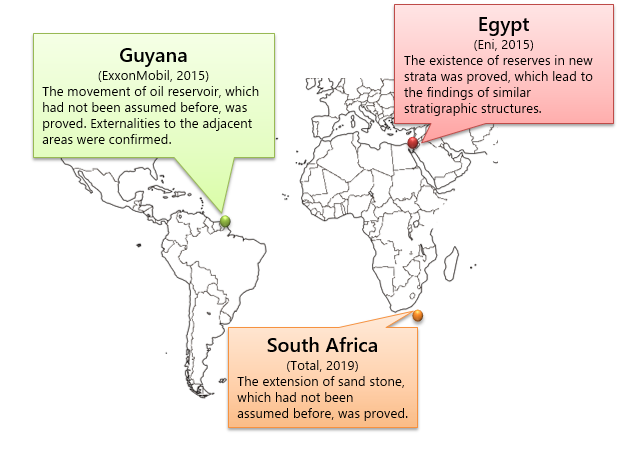
(Source) Created by the Agency for Natural Resources and Energy based on data published on the JOGMEC website and other data.
Cooperation with oil majors for joint development
In oil producing countries including those in the Middle East, their national oil companies have been in charge of the development of oil fields. However, in recent years, there are an increasing number of cases where large global corporations referred to as “oil majors” conduct exploration activities. JOGMEC will support Japanese companies in a flexible manner so that they can enter into partnership with oil majors for various activities such as joint exploration and 3D seismic survey.
Utilization of oil stockpiles in an effective manner
In order to enhance energy security, “stockpiling” of resources is of critical importance. Oil stocks in Japan consist of the 3 categories shown below.
- “Government oil stockpiling” held by the government
- “Private sector oil stockpiling” held by private companies such as oil refiners
- “Joint oil storage with oil producing countries” which are held by the national oil companies of oil producing countries in tanks located within Japan.
Oil stocks equivalent to approximately 200 days of domestic demand are currently kept with the above three categories combined.
Locations of government stockpiling of crude oil
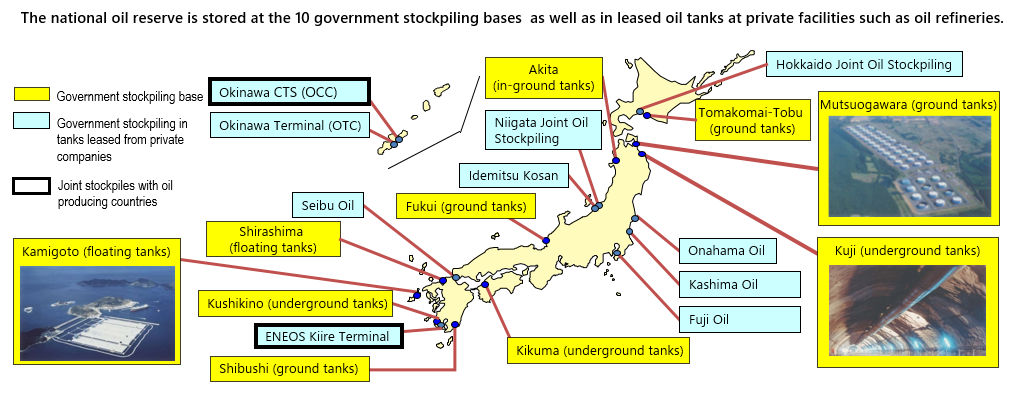
Stock levels in days of major oil consuming nations (as of May, 2019)
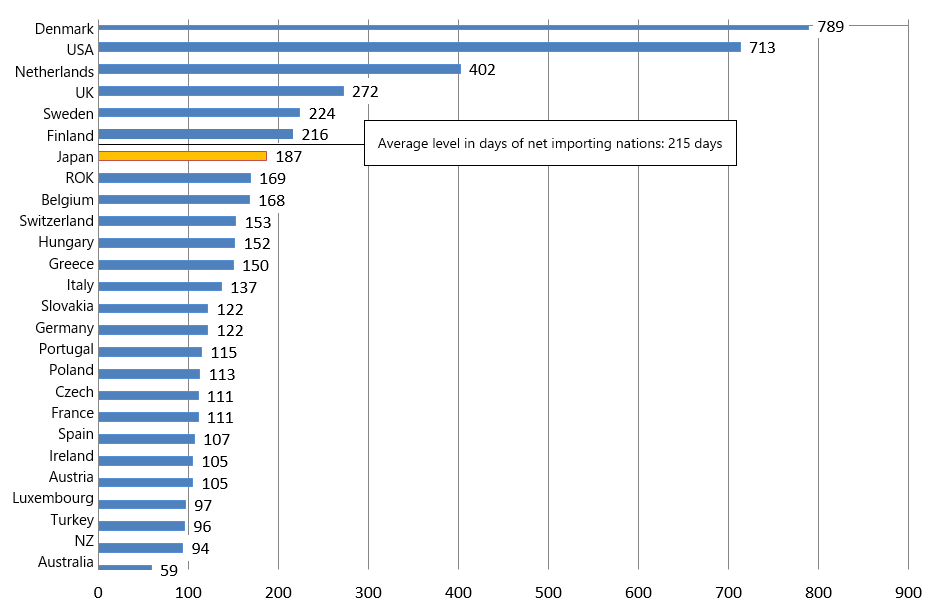
(Source) Created by the Agency for Natural Resources and Energy based on data published by the IEA on its website and other information
As mentioned earlier, the state of affairs in the Middle East have been tense recently, and fears have increased that oil supplies may be restricted over a long period of time. It is essential to put in place the system of utilizing emergency oil stocks in an effective and smooth manner by conducting routine training and simulations. The new strategy upholds a policy that a new organization is to be established by government-private collaboration for a solid emergency response.
It is also important to enhance energy security in Asia by utilizing oil stockpiling- related assets held by Japan. Should Asia face an emergency situation in terms of oil supply, it would certainly make a severe impact on Japan.
Oil consumption in Asian nations is increasing rapidly in line with remarkable economic growth. However, many of them depend heavily on the Middle East for crude oil imports. Additionally, their emergency oil reserves are insufficient in quantities, which may cause a potential threat to energy security.
Crude oil supply sources for Asian countries (2019)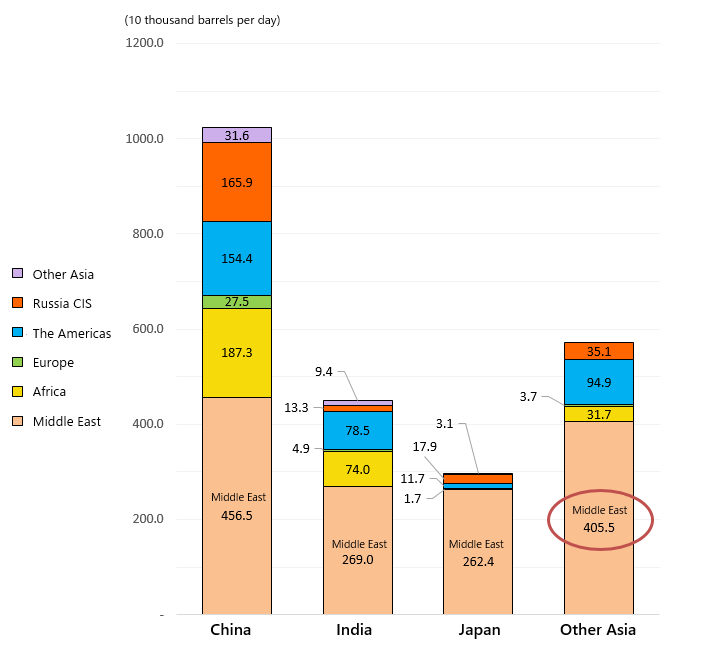
(Source) BP Statistical Review of World Energy
Japan aims to play a leading role as a hub of energy security in Asia taking advantage of its accumulated experience and knowledge together with assets of oil reserves. It will actively advance cooperation in terms of oil reserves which includes mutual supply of crude oil and products in emergency situations in a way that is beneficial to all nations concerned.
Enhancing the foundation of a stable supply of oil
Oil, without doubt, remains one of the most important energy sources. It is essential to maintain a foundation that will ensure its stable supply.
For this purpose, Japanese oil companies including oil refiners need to be more competitive and strengthen their efforts for building business networks by expanding into Asian markets which are expected to grow rapidly. The government of Japan will support private companies by advancing resource diplomacy and gathering relevant information about overseas situations.
One of the challenges facing Japan is how oil can be supplied without disruption in case of emergency. There have been an increasing number of sudden incidents hindering availability of fuels. Some examples are large-scale blackouts caused by natural disasters such as earthquakes and typhoons, and fuel price hikes due to tense situations in the Middle East. These emergencies need to be prepared for so that impacts on electricity supply can be minimized. It is important to strengthen the capability to provide contingency support measures. To this end, a system will be put in place whereby the government comes to the fore to make fuels available in case of emergency.
Division in charge
About the article
Policy Planning Division, Natural Resources and Fuel Department
About Special Contents
Research and Public Relations Office, Policy Planning and Coordination Division, Commissionerʼs Secretariat
![]() The original Japanese text of this article; Click here
The original Japanese text of this article; Click here